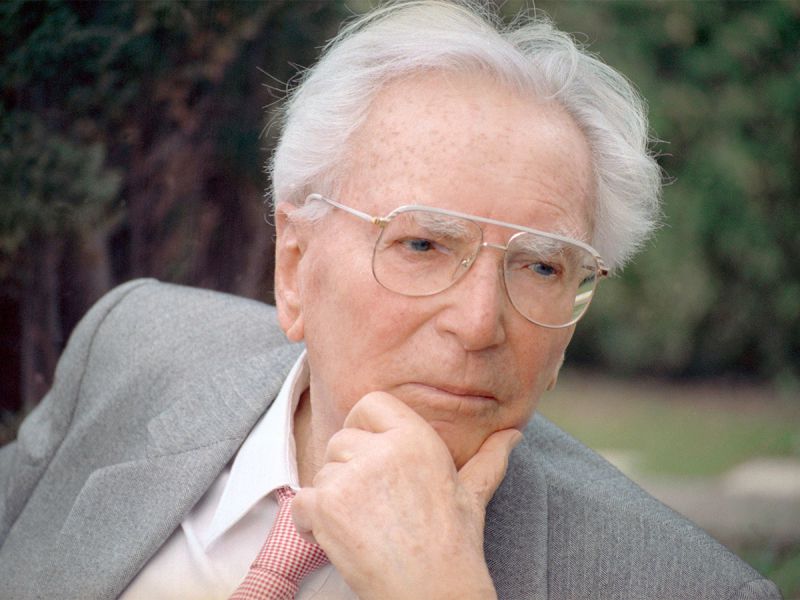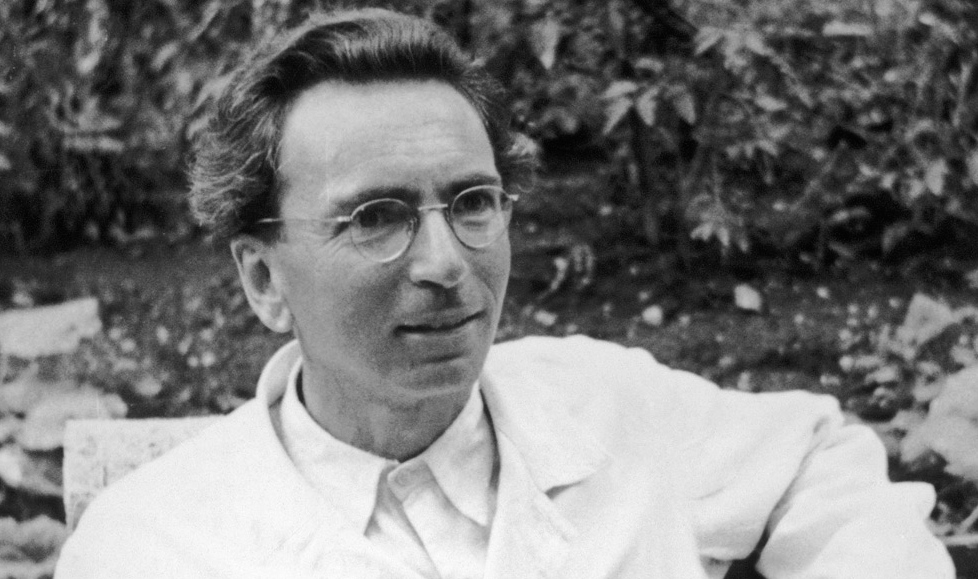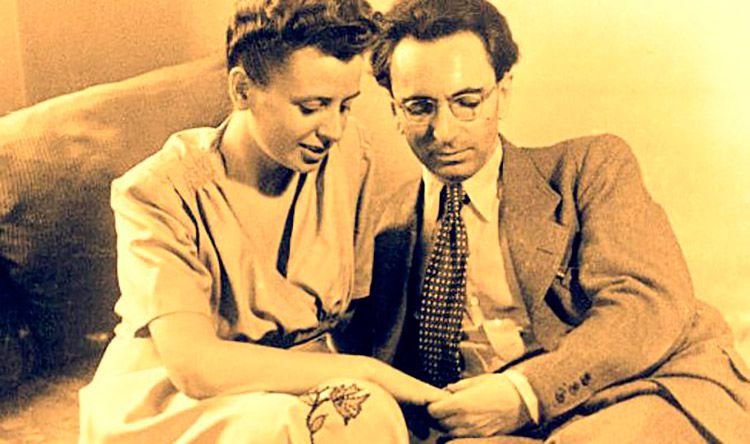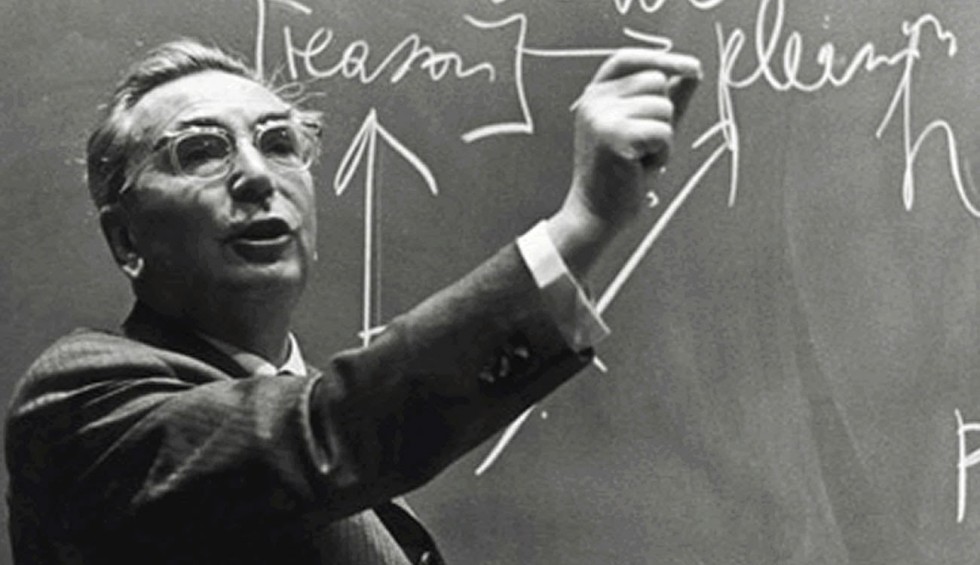Doctor of vertex psychology viktor frankl on the meaning of life

Viktor Emil Frankl (March 26, 1905 - September 2, 1997) - Austrian psychiatrist, psychologist and neurologist, former prisoner of a Nazi concentration camp. He is known as the creator of logotherapy - a method of existential psychoanalysis, which became the basis of the Third Vienna School of Psychotherapy.
There is no situation in the world that does not contain a core of meaning. But it is not enough to fill life with meaning, you need to perceive it as a mission, realizing your responsibility for the final result. Victor Frankl
In his youth, deciding who he should become - a cartoonist or a psychotherapist, Viktor Frankl said to himself: "As a cartoonist, I will be able to notice human weaknesses and shortcomings, but as a psychotherapist I can see the opportunities for overcoming them behind today's weaknesses." Letters from different countries with the words "Dr. Frankl, your books have changed my whole life" were the best confirmation that he made the right choice.
In my youth, like many, I was tormented by the question: who needs my life? I looked for answers everywhere, but mostly books helped: Richard Bach, Thomas Mann, Hermann Hesse ... They did not give recipes, but raised new questions, but it was even interesting. And when my father brought Victor Frankl's just published book "A Man in Search of Meaning", I felt like a traveler who was tormented by thirst and suddenly saw a spring gushing out of the ground. The word meaning was then a sign of recognition for me, meaning was much spoken about in classrooms, in the kitchen, under the starry sky ...
I read the book in one night and, having closed the last page, already knew that I would return to it more than once. And I still come back, trying to understand the person who wrote it, based on my own experience, because I realized that otherwise it was impossible to explain to anyone the meaning of life.
You can only know yourself by acting, not thinking. Goethe
Viktor Frankl ... Who was he? A professor of neurology, a professional psychotherapist? A climber who conquered mountain peaks? A pilot who made his first independent flight at 67 years old? A composer whose music is featured on popular TV shows? A concentration camp prisoner who survived in inhuman conditions in spite of everything? A kind genius whose books help to heal from boredom and vanity? All this and much more. But above all - a Man who knew how to discern in everyone the good that, perhaps, sleeps for the time being. See and wake up ...
Viktor Frankl was born in 1905 in Vienna, his childhood and adolescence fell on the difficult years of the First World War, economic crises and psychological instability. Together with them the need to find his place in the world grew in the boy. As a thirteen-year-old teenager, having heard from a teacher that life is ultimately nothing but an oxidation process, Frankl could not stand it and jumped up with the question: "What is the meaning of life then?" Trying to find a certain balancing principle that underlies the entire Universe, he wrote several notebooks during his school years, giving them a loud name: "We and the Universe." All this time, fighting despair and misunderstanding, Frankl developed an immunity against nihilism.
Perhaps someone will think that fate was destined for him to become a psychotherapist, because it was at this time that Freud's school was actively developing in Vienna, and a little later the school of individual psychotherapy of his opponent Adler appeared. Perhaps, but Frankl did not stop at their ideas, he continued to search.
 Victor Frankl in his youth.
Victor Frankl in his youth. In 1928, in an effort to prevent suicide among students, he opened a youth counseling center in Vienna and together with like-minded people defeated this problem: for the first time in many years, the number of suicides among young people began to decline. Frankl received his M.D. in 1930 and continued to work in the field of clinical psychiatry. He strove for people who turn to him to begin to realize that they are free to change something in the world for the better and change themselves for the better, if necessary.
When you think about such people, you involuntarily ask yourself the question: can I do this? I will be able to follow the rules that Frankl developed for himself:
- Treat the smallest things with the same care as the biggest. And do the biggest things as calmly as the smallest.
- Try to do everything as quickly as possible, and not at the last moment.
- First, do all the unpleasant things, and only then the pleasant ones.
It seems to be simple, but ... The second point suffered especially, and I always found an excuse for myself. This, probably, was different from Frankl, because if he could not adhere to the rules, he could not talk to himself for several days.
Often in his work, Frankl used the method of paradoxical intention, which he himself developed. The essence of the method is as follows: instead of running away from unpleasant feelings and situations associated with them, you need to go towards them. To get rid of a symptom, you need to form a paradoxical intention, that is, the desire to do something opposite to what you need to get rid of, and it is desirable to do this in a humorous form. Laughter allows you to look at yourself and your problems from the outside and gain control over yourself. Frankl mastered this method well and encouraged his followers to do the same; he cited examples from his own and their practice in his book. The results are really impressive, but what a sense of humor must be possessed to offer a patient suffering from hand shaking to arrange a shaking competition, and even to encourage him to shake faster and harder! Or instruct a patient suffering from insomnia to stay awake all night. And you need to be very courageous, so as not to be embarrassed by the patient's remark: "Doctor, I always thought that I was abnormal, but it seems to me that you are too" - calmly answer: "You see, sometimes it gives me pleasure to be abnormal."
Only the top of a person is a person. Paracelsus
But the most important thing in the work of a psychotherapist is not techniques and techniques. Frankl was ready to answer phone calls at any time of the day, look for different options for explanations and always tried to see a person behind a clinical case. He believed that a picture of a disease is just a caricature, a shadow of a person, and it is possible to be a psychiatrist only for the sake of the human in the sick and for the spiritual in the person. Many of Frankl's patients admitted that gratitude to a person who was ready to listen to them even at three in the morning and knew how to see in them the good that they themselves had long ceased to believe in kept them from irreparable actions.
The Second World War prevented the publication of his first manuscript "Healing of the Soul" with the basics of logotherapy, treatment through the search for the meaning of life. At this time, Frankl was the head of the neurological department of the Jewish Hospital in Vienna. He could emigrate to the United States, but he understood that then he would leave his elderly parents to their own devices and would not be able to help them in any way. He also knew that he, a Jew, would have almost no chance of surviving ... Frankl decided to seek advice from heaven. The first thing he saw when he came home was a piece of marble with one of the ten commandments: "Honor your father and your mother and you will abide on earth." In the depths of his soul, he had already decided to stay, and the commandment only helped to realize this. For two more years he continued to work, since the Gestapo officer, on whom the fate of Frankl depended, was his patient. But in 1942 he ended up in a concentration camp with his parents and wife. His sacrifice made sense. Both mother and father of Frankl died, although in a concentration camp, but in his arms. And the doctrine of the meaning passed the test in four camps, proving its right to exist.
 Viktor Frankl with his wife.
Viktor Frankl with his wife. In the concentration camp, Frankl organized a psychological assistance service for prisoners, learned about those who lost the purpose and meaning of life, and tried to help them ... He saw how the mysterious "stubbornness of spirit" allowed people to remain free even in a concentration camp and not depend on the conditions in which they hit. “Here in the camp there were people who always had a kind word to support their comrade, they were ready to share their last piece of bread. Of course, they were few in number - these people who chose for themselves the opportunity to preserve their humanity, but they set an example for others, and this example caused a chain reaction. "
It was not those who were stronger that survived in inhuman conditions, but those who had something to live for. After the war, Frankl wrote: “As a professor in two fields, neurology and psychiatry, I am well aware of the extent to which a person depends on biological, psychological and social conditions, but in addition, I am still a person who survived in four concentration camps - and therefore I witness to what an unexpected degree a person is able to challenge the most difficult conditions imaginable. "
Frankl also had something to live for, because he kept the manuscript of the book with the first version of the doctrine of meaning and made sure that it survived, and when this failed, he hoped to restore it. In the typhus barracks of the concentration camp, he was able to deflect attacks of fever, use excitement and intellectual enthusiasm in order to recreate his scientific work - for 16 crazy nights, Frankl made short stenographic notes on tiny scraps of paper in the dark.
If we accept people as they are, we make them worse. If we treat them as if they are what they should be, we help them become what they are able to become. Goethe
His inner life continued, he imagined how after the war he would talk about everything he had experienced, mentally communicated with his wife - this helped him not to break down. “I realized that love penetrates far beyond the essence of a loved one, allowing the soul to break away from the existence of a prisoner ... More and more I felt the feeling that my wife is present here, that she is with me, that I can touch her, take her hands into mine, ”wrote Frankl. He saw his wife in a bird crouching next to him on the ground, her face was brighter than the rays of the setting sun, and no one in those minutes could convince him that this was not so. Sometimes the heart is wiser than the mind, Frankl believed. And sometimes it is wiser not to be too reasonable ...
The fact that Frankl managed to survive, there is probably a grain of luck. He was transferred from camp to camp, he was put on death lists, worked with infectious patients, tried to escape ... But if it were not for the "stubbornness of the spirit", the ability to hear fate and the voice of conscience, no chance would have helped him.
After the war, returning to Vienna, Frankl came to his friend Paul Polog and told him about the death of his parents, brother and wife. He could not help crying: “When something like this happens to someone, when a person is subjected to similar tests, then all this must have some meaning. I have a feeling that something is awaiting me, that I am destined for something. " No one could understand him better than his old friend, because Frankl himself had to cope with the crisis. “Suffering has meaning only if it changes me for the better,” he wrote. And, like no one else, I understood that any drugs that help numb the pain of loss and forget those you loved will not help. But around Frankl saw people who also experienced the same pain, were confused, lonely and also needed help, and he again found the meaning: "The meaning of my life is to help others see meaning in their lives."
Frankl described his experiences and experiences in the book "The Psychologist in a Concentration Camp", which was published shortly after the war. He wanted to publish it anonymously, not thinking that someone would be interested in it, and only friends persuaded him to put his name all the same. It was this work that became the most famous.
 Viktor Frankl at a lecture.
Viktor Frankl at a lecture. In 1946, Viktor Frankl became director of the Vienna Neurological Polyclinic, from 1947 he began teaching at the University of Vienna, writing several books one after another. His "Man in Search of Meaning" is translated into 24 languages. Since the 1960s, he has traveled a lot around the world and feels that in this relatively peaceful time, the problem of the meaning of life has become even more urgent. In the post-war world, more dynamic, more developed and richer, people gained more opportunities and prospects, but began to lose the meaning of life.
Frankl called his psychotherapy the summit, because he saw heights in the human soul to which one should strive. And he said that a person needs to be helped to gain the courage to live spiritually, to remind him that he has a spirit. “Despite our belief in human human potential, we must not close our eyes to the fact that human people are ... a minority,” Frankl wrote. "But that's why each of us feels challenged to join this minority." A man is somewhat like an airplane, he joked. An airplane can travel on the ground, but to prove that it is an airplane, it must take off. So are we: if we stay on the ground, no one will guess that we can fly.
When asked to say what the meaning of life was, Frankl smiled. After all, there is no universal, only correct answer to this question. Each person and each moment has its own meaning, unique. “There is no situation in the world that does not contain a core of meaning,” Frankl said. “But it’s not enough to fill life with meaning, you need to perceive it as a mission, realizing your responsibility for the end result.”



